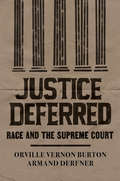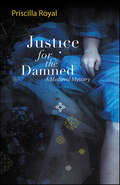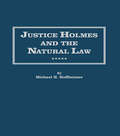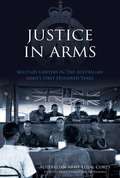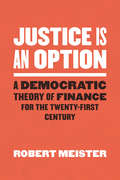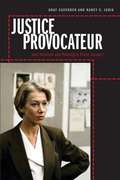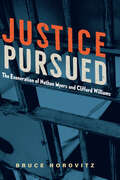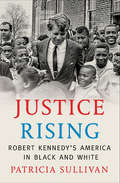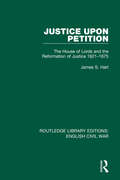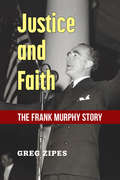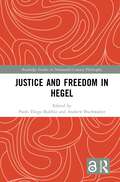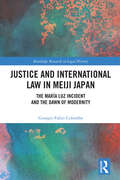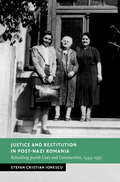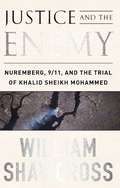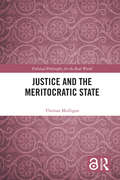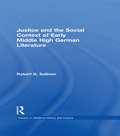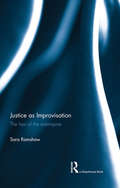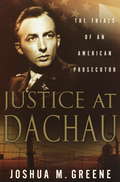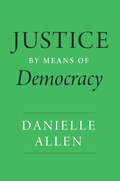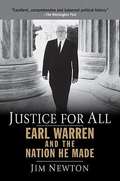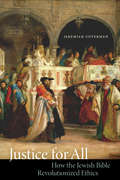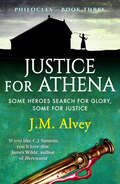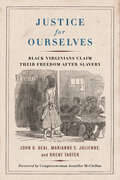- Table View
- List View
Justice Deferred: Race and the Supreme Court
by Orville Vernon Burton Armand DerfnerIn the first comprehensive accounting of the U.S. Supreme Court’s race-related jurisprudence, a distinguished historian and renowned civil rights lawyer scrutinize a legacy too often blighted by racial injustice. The Supreme Court is usually seen as protector of our liberties: it ended segregation, was a guarantor of fair trials, and safeguarded free speech and the vote. But this narrative derives mostly from a short period, from the 1930s to the early 1970s. Before then, the Court spent a century largely ignoring or suppressing basic rights, while the fifty years since 1970 have witnessed a mostly accelerating retreat from racial justice. From the Cherokee Trail of Tears to Brown v. Board of Education to the dismantling of the Voting Rights Act, historian Orville Vernon Burton and civil rights lawyer Armand Derfner shine a powerful light on the Court’s race record—a legacy at times uplifting, but more often distressing and sometimes disgraceful. For nearly a century, the Court ensured that the nineteenth-century Reconstruction amendments would not truly free and enfranchise African Americans. And the twenty-first century has seen a steady erosion of commitments to enforcing hard-won rights. Justice Deferred is the first book that comprehensively charts the Court’s race jurisprudence. Addressing nearly two hundred cases involving America’s racial minorities, the authors probe the parties involved, the justices’ reasoning, and the impact of individual rulings. We learn of heroes such as Thurgood Marshall; villains, including Roger Taney; and enigmas like Oliver Wendell Holmes and Hugo Black. Much of the fragility of civil rights in America is due to the Supreme Court, but as this sweeping history also reminds us, the justices still have the power to make good on the country’s promise of equal rights for all.
Justice For The Damned (Medieval Mysteries #4)
by Priscilla RoyalIt is May of 1272, and Prioress Eleanor of Tyndale, recovering from a near-fatal winter fever, journeys to Amesbury Priory to visit her aunt in time for the Feast of Saint Melor. Although Eleanor hopes to regain her strength in the midst of pleasant childhood memories, Death reveals a most troublesome fondness for her company. A ghost now haunts Amesbury. And when a man is decapitated near the river where the grim figure walks, Sister Beatrice, Eleanor's aunt and acting prioress of Amesbury, shows an uncharacteristic hesitancy about taking charge of any investigation. As others apparently fall victim to the vengeful ghost, Eleanor struggles to put a human face on the restless spirit, and Brother Thomas, pursuing a secret mission for the Church connected with the Priory's famous Psaltery, finds that his own demons have unexpectedly taken on a very human form....
Justice Holmes and the Natural Law: Studies in the Origins of Holmes Legal Philosophy (Distinguished Studies in American Legal and Constitutional History)
by Michael H. HoffheimerFirst Published in 1993. Routledge is an imprint of Taylor & Francis, an informa company.
Justice In Arms: Military Lawyers In The Australian Army's first Hundred Years
by Australian Army Legal CorpsJustice in Arms brings to life a fascinating and important element of Australia&’s legal history — the role of Army legal officers in Australia and in expeditionary operations from the Boer War until 2000. This is a comprehensive and absorbing history which describes the dynamic interaction of institutional and political imperatives and the personalities who managed this interaction over the decades. It is populated by colourful characters and legal luminaries and demonstrates that military justice is rightly concerned with discipline and cohesiveness. Reflecting broader societal norms, it is also concerned with the rule of law and respect for the rights, liberties and fair treatment of those who serve in the armed forces. Justice in Arms describes the extraordinary contribution of Army legal officers to both the profession of arms and the development of the law, charting the evolving personal and structural relationships between Army legal officers and command dictated by the changing legal needs of the Army and the broader Australian Defence Force. Today Army legal officers apply, adapt and shape the law to meet evolving needs in peacetime and during armed conflict and peace operations, ensuring the legitimacy of military action and the maintenance of domestic and international support for national objectives.
Justice Is an Option: A Democratic Theory of Finance for the Twenty-First Century (Chicago Studies in Practices of Meaning)
by Robert MeisterMore than ten years after the worst crisis since the Great Depression, the financial sector is thriving. But something is deeply wrong. Taxpayers bore the burden of bailing out “too big to fail” banks, but got nothing in return. Inequality has soared, and a populist backlash against elites has shaken the foundations of our political order. Meanwhile, financial capitalism seems more entrenched than ever. What is the left to do? Justice Is an Option uses those problems—and the framework of finance that created them—to reimagine historical justice. Robert Meister returns to the spirit of Marx to diagnose our current age of finance. Instead of closing our eyes to the political and economic realities of our era, we need to grapple with them head-on. Meister does just that, asking whether the very tools of finance that have created our vastly unequal world could instead be made to serve justice and equality. Meister here formulates nothing less than a democratic financial theory for the twenty-first century—one that is equally conversant in political philosophy, Marxism, and contemporary politics. Justice Is an Option is a radical, invigorating first page of a new—and sorely needed—leftist playbook.
Justice Is an Option: A Democratic Theory of Finance for the Twenty-First Century (Chicago Studies in Practices of Meaning)
by Robert MeisterMore than ten years after the worst crisis since the Great Depression, the financial sector is thriving. But something is deeply wrong. Taxpayers bore the burden of bailing out “too big to fail” banks, but got nothing in return. Inequality has soared, and a populist backlash against elites has shaken the foundations of our political order. Meanwhile, financial capitalism seems more entrenched than ever. What is the left to do? Justice Is an Option uses those problems—and the framework of finance that created them—to reimagine historical justice. Robert Meister returns to the spirit of Marx to diagnose our current age of finance. Instead of closing our eyes to the political and economic realities of our era, we need to grapple with them head-on. Meister does just that, asking whether the very tools of finance that have created our vastly unequal world could instead be made to serve justice and equality. Meister here formulates nothing less than a democratic financial theory for the twenty-first century—one that is equally conversant in political philosophy, Marxism, and contemporary politics. Justice Is an Option is a radical, invigorating first page of a new—and sorely needed—leftist playbook.
Justice Is an Option: A Democratic Theory of Finance for the Twenty-First Century (Chicago Studies in Practices of Meaning)
by Robert MeisterMore than ten years after the worst crisis since the Great Depression, the financial sector is thriving. But something is deeply wrong. Taxpayers bore the burden of bailing out “too big to fail” banks, but got nothing in return. Inequality has soared, and a populist backlash against elites has shaken the foundations of our political order. Meanwhile, financial capitalism seems more entrenched than ever. What is the left to do? Justice Is an Option uses those problems—and the framework of finance that created them—to reimagine historical justice. Robert Meister returns to the spirit of Marx to diagnose our current age of finance. Instead of closing our eyes to the political and economic realities of our era, we need to grapple with them head-on. Meister does just that, asking whether the very tools of finance that have created our vastly unequal world could instead be made to serve justice and equality. Meister here formulates nothing less than a democratic financial theory for the twenty-first century—one that is equally conversant in political philosophy, Marxism, and contemporary politics. Justice Is an Option is a radical, invigorating first page of a new—and sorely needed—leftist playbook.
Justice Provocateur: Jane Tennison and Policing in Prime Suspect
by Gray Cavender Nancy C. JurikJustice Provocateur focuses on Prime Suspect, a popular British television film series starring Oscar and Emmy award-winning actress Helen Mirren as fictional London policewoman Jane Tennison. Gray Cavender and Nancy C. Jurik examine the media constructions of justice, gender, and police work in the show, exploring its progressive treatment of contemporary social problems in which women are central protagonists. They argue that the show acts as a vehicle for progressive moral fiction--fiction that gives voice to victim experiences, locates those experiences within a larger social context, transcends traditional legal definitions of justice for victims, and offers insights into ways that individuals might challenge oppressive social and organizational arrangements. Although Prime Suspect is often seen as a uniquely progressive, feminist-inspired example within the typically more conservative, male-dominated crime genre, Cavender and Jurik also address the complexity of the films' gender politics. Consistent with some significant criticisms of the films, they identify key moments in the series when Tennison's character appears to move from a successful woman who has it all to a post-feminist stereotype of a lonely, aging career woman with no strong family or friendship ties. Shrewdly interpreting the show as an illustration of the tensions and contradictions of women's experiences and their various relations to power, Justice Provocateur provides a framework for interrogating the meanings and implications of justice, gender, and social transformation both on and off the screen.
Justice Pursued: The Exoneration of Nathan Myers and Clifford Williams
by Bruce HorovitzAn in-depth look at the reversal of a wrongful conviction in a noteworthy example of the justice system seeking to correct mistakes of the past In 2019, Nathan Myers and Clifford Williams were released after almost 43 years in prison when murder charges against them were dismissed in the first exoneration brought about through a Conviction Integrity Review unit in Florida. Justice Pursued is the story of this wrongful conviction and its landmark reversal, which made headlines as it was initiated by the same state office that sought the death penalty for both men in 1976.Journalist Bruce Horovitz describes in detail the events of the murder of Jeanette Williams and the one-sided trial, conviction, and life sentencing of Nathan Myers and Clifford Williams, drawing on first-person interviews as well as case documents, newspaper clippings, and other media coverage. Horovitz tells how the two men maintained their innocence for years and petitioned the state to reconsider the case. He highlights the creation of Florida’s first Conviction Integrity Review unit, which reinvestigated the evidence and helped overturn the original verdict. He also looks at the issue of compensating exonerees like Myers and Williams for time imprisoned for crimes they did not commit.Incorporating the perspectives of those involved in the initial case and its reexamination four decades later, this tragic story is also one of hope, perseverance, and vindication. Justice Pursued brings awareness to systemic failures in the criminal justice system, the toll these mistakes exact on victims, and the necessity of prosecutorial review in addressing the growing crisis of wrongful convictions in the United States.
Justice Rising: Robert Kennedy's America in Black and White
by Patricia SullivanA leading civil rights historian places Robert Kennedy for the first time at the center of the movement for racial justice of the 1960s—and shows how many of today’s issues can be traced back to that pivotal time. Bobby Kennedy was an unlikely civil rights hero. A Cold Warrior who once worked for Joe McCarthy, he grew up in a sheltered world where segregation was the norm. But when he became attorney general in 1961, he plunged headfirst into the politics of race. In this landmark reconsideration of his life and legacy, Patricia Sullivan reveals how he grasped the moment to emerge as a transformational leader at a tumultuous time. Drawing on government files, personal papers, and oral interviews with many of those who worked with him, Justice Rising shows how RFK used all the tools at his disposal to confront violent resistance to desegregation across the South. He pioneered the use of federal powers to challenge voting rights violations, intervened personally to desegregate schools, and championed criminal justice reform. The Justice Department under Kennedy became an incubator of change, where policy was imagined, tested, and put to work on the volatile frontier of race, crime, and the law. When violent racial uprisings broke out in northern cities and many called for more aggressive law enforcement, Kennedy pushed to address their root causes: entrenched poverty, decaying housing, substandard schools, predatory policing, and a near total absence of employment opportunities. As a presidential candidate before his tragic assassination in 1968 he sought to bridge the nation’s racial divisions. Deeply researched and compellingly written, Justice Rising offers a groundbreaking reconsideration of Robert Kennedy’s role in the culminating years of the civil rights movement and sheds new light on the battles that remain.
Justice Upon Petition: The House of Lords and the Reformation of Justice 1621-1675
by James S. HartOriginally published in 1991, this book traces the evolution of the House of Lords as a court for private litigation during the critically important years from 1621 to 1675. It offers new insights into contemporary politics, government and religion, adding an important dimension to our understanding of the House of Lords. This book is primary reading for advanced undergraduates and postgraduate students on courses on early Stuart England, the Civil War and Restoration history.
Justice and Faith: The Frank Murphy Story
by Greg ZipesFrank Murphy was a Michigan man unafraid to speak truth to power. Born in 1890, he grew up in a small town on the shores of Lake Huron and rose to become Mayor of Detroit, Governor of Michigan, and finally a U.S. Supreme Court Justice. One of the most important politicians in Michigan’s history, Murphy was known for his passionate defense of the common man, earning him the pun “tempering justice with Murphy.” Murphy is best remembered for his immense legal contributions supporting individual liberty and fighting discrimination, particularly discrimination against the most vulnerable. Despite being a loyal ally of Franklin Delano Roosevelt, when FDR ordered the removal of Japanese Americans during World War II, Supreme Court Justice Murphy condemned the policy as “racist” in a scathing dissent to the Korematsu v. United States decision—the first use of the word in a Supreme Court opinion. Every American, whether arriving by first class or in chains in the galley of a slave ship, fell under Murphy’s definition of those entitled to the full benefits of the American dream. Justice and Faith explores Murphy’s life and times by incorporating troves of archive materials not available to previous biographers, including local newspaper records from across the country. Frank Murphy is proof that even in dark times, the United States has extraordinary resilience and an ability to produce leaders of morality and courage.
Justice and Freedom in Hegel (Routledge Studies in Nineteenth-Century Philosophy)
by Andrew Buchwalter Paolo Diego BubbioThis volume explores the relationship between justice and freedom in Hegel’s practical philosophy, with a particular focus on the pivotal concept of reciprocal recognition. The contributors analyze the intersubjective relations between individuals and institutions through the lens of Hegel and demonstrate how his account of justice and freedom can be applied to address pressing issues in political philosophy.Despite extensive scrutiny of the concept of justice by political philosophers, Hegel’s unique account has been notably overlooked. What sets Hegel apart is his emphasis on the inseparable link between justice and freedom. Freedom is inextricably tied to an account of just social relations and institutions, while justice itself is intertwined with a robust endorsement of freedom. The chapters comprising this volume examine three crucial dimensions of Hegel’s framework for freedom and justice. First, the contributors address how Hegel’s distinctive integration of freedom and justice sheds new light on the nature of his practical philosophy. Second, they relate Hegel’s theory to other prominent accounts of justice, including Rawlsian forms of Kantian constructivism, Habermas’ neo‑Kantian discourse theory, republican views, neo‑Aristotelian accounts, and critical theory approaches. Finally, the contributors apply Hegel’s reconstructed theory of justice to ongoing debates encompassing criminal justice, distributive justice, global justice, environmental justice, and issues related to racial and gender justice, as well as populism.Justice and Freedom in Hegel will appeal to scholars and advanced students engaged in research on Hegel’s practical philosophy, 19th‑century philosophy, and political philosophy.
Justice and International Law in Meiji Japan: The María Luz Incident and the Dawn of Modernity (Routledge Research in Legal History)
by Giorgio Fabio ColomboThis book carries out a comprehensive analysis of the María Luz incident, a truly significant episode in Japanese and world history, from a legal perspective. In July 1872, the María Luz, a barque flying the Peruvian flag, carried Chinese indentured servants from Macau to Peru. After the ship stopped for repairs in Kanagawa Bay, a number of legal issues arose that were destined to change the perception and use of the law in Japan forever. The case had a tremendous impact on the collective imagination, both Japanese and international: it is one of the first occurrences in which an Asian country decided to resist the pressure of a Western nation, and responded using the most refined tools of domestic and international law. Moreover, the final outcome of the case (arbitration in front of the Czar of Russia) marks the debut of Japan on the stage of international arbitration. While historians have written widely on the subject, the legal importance of this event has been relatively neglected. This book uses the case to explore the technical legal issues Japan was facing in its transition from pre-modernity to modernity. These include unequal treaties, extraterritoriality clauses, the need to establish an updated judicial system, and a delicate balance between asserting sovereignty and resorting to diplomacy in solving disputes involving foreigners. Based on original documents, this book is an invaluable resource for researchers and academics in the fields of legal history, dispute resolution, international law, Japanese history and Asian studies.
Justice and Restitution in Post-Nazi Romania: Rebuilding Jewish Lives and Communities, 1944–1950 (New Studies in European History)
by Stefan Cristian IonescuOn 23rd August 1944, following the collapse of the pro-Nazi dictatorship of Ion Antonescu, Romania changed sides and abandoned the Axis to join the Allies. Justice and Restitution in Post-Nazi Romania explores the hopes, struggles and disappointments of Jewish communities in Romania seeking to rebuild their lives after the Holocaust. Focusing on the efforts of survivors to recuperate rights and property, Stefan Cristian Ionescu demonstrates how the early transitional government enabled short term restitution. However, from 1948, the consolidated communist regime implemented nationalizations which dispossessed many citizens. Jewish communities were disproportionality affected, and real estate and many businesses were lost once again. Drawing on archival sources from government documentation to diaries and newspaper reports, this study explores both the early success and later reversal of restitution policies. In doing so, it sheds light on the postwar treatment of Romanian Jewish survivors, and the reasons so many survivors emigrated from Romania.
Justice and the Enemy: Nuremberg, 9/11, and the Trial of Khalid Sheikh Mohammed
by William ShawcrossSince the Nuremberg Trials of 1945, lawful nations have struggled to impose justice around the world, especially when confronted by tyrannical and genocidal regimes. But in Cambodia, the USSR, China, Bosnia, Rwanda, and beyond, justice has been served haltingly if at all in the face of colossal inhumanity. International Courts are not recognized worldwide. There is not a global consensus on how to punish transgressors. The war against Al Qaeda is a war like no other. Osama bin Laden, Al Qaeda's founder, was killed in Pakistan by Navy Seals. Few people in America felt anything other than that justice had been served. But what about the man who conceived and executed the 9/11 attacks on the US, Khalid Sheikh Mohammed? What kind of justice does he deserve? The U. S. has tried to find the high ground by offering KSM a trial - albeit in the form of military tribunal. But is this hypocritical? Indecisive? Half-hearted? Or merely the best application of justice possible for a man who is implacably opposed to the civilization that the justice system supports and is derived from? In this book, William Shawcross explores the visceral debate that these questions have provoked over the proper application of democratic values in a time of war, and the enduring dilemma posed to all victors in war: how to treat the worst of your enemies.
Justice and the Meritocratic State (Political Philosophy for the Real World)
by Thomas MulliganLike American politics, the academic debate over justice is polarized, with almost all theories of justice falling within one of two traditions: egalitarianism and libertarianism. This book provides an alternative to the partisan standoff by focusing not on equality or liberty, but on the idea that we should give people the things that they deserve. Mulligan sets forth a theory of economic justice—meritocracy—which rests upon a desert principle and is distinctive from existing work in two ways. First, meritocracy is grounded in empirical research on how human beings think, intuitively, about justice. Research in social psychology and experimental economics reveals that people simply don’t think that social goods should be distributed equally, nor do they dismiss the idea of social justice. Across ideological and cultural lines, people believe that rewards should reflect merit. Second, the book discusses hot-button political issues and makes concrete policy recommendations. These issues include anti-meritocratic bias against women and racial minorities and the United States’ widening economic inequality. Justice and the Meritocratic State offers a new theory of justice and provides solutions to our most vexing social and economic problems. It will be of keen interest to philosophers, economists, and political theorists.
Justice and the Social Context of Early Middle High German Literature (Studies in Medieval History and Culture #5)
by Robert G. SullivanThis book argues that far from preaching traditional, otherworldly ideals, the authors or these religious works were deeply engaged in the social, political, and spiritual issues that characterized the Holy Roman Empire at a time of radical transformation.
Justice as Improvisation: The Law of the Extempore
by Sara RamshawJustice as Improvisation: The Law of the Extempore theorises the relationship between justice and improvisation through the case of the New York City cabaret laws. Discourses around improvisation often imprison it in a quasi-ethical relationship with the authentic, singular ‘other’. The same can be said of justice. This book interrogates this relationship by highlighting the parallels between the aporetic conception of justice advanced by the late French philosopher Jacques Derrida and the nuanced approach to improvisation pursued by musicians and theorists alike in the new and emerging interdisciplinary field of Critical Studies in Improvisation (CSI). Justice as Improvisation re-imagines justice as a species of improvisation through the formal structure of the most basic of legal mechanisms, judicial decision-making, offering law and legal theory a richer, more concrete, understanding of justice. Not further mystery or mystique, but a negotiation between abstract notions of justice and the everyday practice of judging. Improvisation in judgment calls for ongoing, practical decision-making as the constant negotiation between the freedom of the judge to take account of the otherness or singularity of the case and the existing laws or rules that both allow for and constrain that freedom. Yes, it is necessary to judge, yes, it is necessary to decide, but to judge well, to decide justly, that is a music lesson perhaps best taught by critical improvisation scholars.
Justice at Dachau
by Joshua GreeneThe world remembers Nuremberg, where a handful of Nazi policymakers were brought to justice, but nearly forgotten are the proceedings at Dachau, where hundreds of Nazi guards, officers, and doctors stood trial for personally taking part in the torture and execution of prisoners inside the Dachau, Mauthausen, Flossenburg, and Buchenwald concentration camps. In Justice at Dachau, Joshua M. Greene, maker of the award winning documentary film Witness: Voices from the Holocaust, recreates the Dachau trials and reveals the dramatic story of William Denson, a soft-spoken young lawyer from Alabama whisked from teaching law at West Point to leading the prosecution in the largest series of Nazi trials in history. In a makeshift courtroom set up inside Hitler's first concentration camp, Denson was charged with building a team from lawyers who had no background in war crimes and determining charges for crimes that courts had never before confronted. Among the accused were Dr. Klaus Schilling, responsible for hundreds of deaths in his "research" for a cure for malaria; Edwin Katzen-Ellenbogen, a Harvard psychologist turned Gestapo informant; and one of history's most notorious female war criminals, Ilse Koch, "Bitch of Buchenwald," whose penchant for tattooed skins and human bone lamps made headlines worldwide. Denson, just thirty-two years old, with one criminal trial to his name, led a brilliant and successful prosecution, but nearly two years of exposure to such horrors took its toll. His wife divorced him, his weight dropped to 116 pounds, and he collapsed from exhaustion. Worst of all was the pressure from his army superiors to bring the trials to a rapid end when their agenda shifted away from punishing Nazis to winning the Germans' support in the emerging Cold War. Denson persevered, determined to create a careful record of responsibility for the crimes of the Holocaust. When, in a final shocking twist, the United States used clandestine reversals and commutation of sentences to set free those found guilty at Dachau, Denson risked his army career to try to prevent justice from being undone.From the Hardcover edition.
Justice by Means of Democracy
by Danielle AllenFrom leading thinker Danielle Allen, a bold and urgent articulation of a new political philosophy: power-sharing liberalism. At a time of great social and political turmoil, when many residents of the leading democracies question the ability of their governments to deal fairly and competently with serious public issues, and when power seems more and more to rest with the wealthy few, this book reconsiders the very foundations of democracy and justice. Scholar and writer Danielle Allen argues that the surest path to a just society in which all are given the support necessary to flourish is the protection of political equality; that justice is best achieved by means of democracy; and that the social ideals and organizational design principles that flow from recognizing political equality and democracy as fundamental to human well-being provide an alternative framework not only for justice but also for political economy. Allen identifies this paradigm-changing new framework as “power-sharing liberalism.” Liberalism more broadly is the philosophical commitment to a government grounded in rights that both protect people in their private lives and empower them to help govern public life. Power-sharing liberalism offers an innovative reconstruction of liberalism based on the principle of full inclusion and non-domination—in which no group has a monopoly on power—in politics, economy, and society. By showing how we all might fully share power and responsibility across all three sectors, Allen advances a culture of civic engagement and empowerment, revealing the universal benefits of an effective government in which all participate on equal terms.
Justice for All: Earl Warren and the Nation He Made
by Jim NewtonIn Justice for All, Jim Newton, an award-winning journalist for the Los Angeles Times, brings readers the first truly comprehensive consideration of Earl Warren, the politician-turned-Chief Justice who refashioned the place of the court in American life through landmark Supreme Court cases whose names have entered the common parlance -- Brown v. Board of Education, Griswold v. Connecticut, Miranda v. Arizona, to name just a few. Drawing on unmatched access to government, academic, and private documents pertaining to Warren's life and career, Newton explores a fascinating angle of U. S. Supreme Court history while illuminating both the public and the private Warren. One of the most acclaimed and best political biographies of its time, Justice for All is a monumental work dedicated to a complicated and principled figure that will become a seminal work of twentieth-century U. S. history. .
Justice for All: How the Jewish Bible Revolutionized Ethics (JPS Essential Judaism)
by Jeremiah UntermanJustice for All demonstrates that the Jewish Bible, by radically changing the course of ethical thought, came to exercise enormous influence on Jewish thought and law and also laid the basis for Christian ethics and the broader development of modern Western civilization. Jeremiah Unterman shows us persuasively that the ethics of the Jewish Bible represent a significant moral advance over Ancient Near East cultures. Moreover, he elucidates how the Bible’s unique conception of ethical monotheism, innovative understanding of covenantal law, and revolutionary messages from the prophets form the foundation of many Western civilization ideals. Justice for All connects these timeless biblical texts to the persistent themes of our times: immigration policy, forgiveness and reconciliation, care for the less privileged, and attaining hope for the future despite destruction and exile in this world.
Justice for Athena (Philocles)
by J. M. AlveyA playwright turned amateur sleuth who is &“the perfect protagonist&” solves a murder at a celebration in this historical mystery set in ancient Greece (Financial Times). It&’s festival time in Athens, and Philocles is looking forward to the holiday. Visitors are coming from across the Hellenic world for eight days of sporting competitions, musical contests, and sacred rites to honor Athena, the city&’s patron goddess. Thousands will flock to the Pnyx to be enthralled by the dramatic three-day performance of Homer&’s Iliad, an entertainment unique to the Great Panathenaea. Taking part is the highest honor and greatest challenge for an epic poet. Then one of the poets is brutally murdered. Is this random misfortune, an old score being settled, or is someone trying to sabotage the festival? The authorities want this cleared up quickly and quietly. Philocles finds himself on the trail of a killer once more . . . Longlisted for the 2021 CWA Sapere Books Historical Dagger Praise for the writing of J. M. Alvey: &“Historical writing at its best. Riveting.&” —Manda Scott, author of the Boudica series &“Superb . . . A fabulous read.&” —The Irish Times &“If you like C J Sansom's Tudor sleuth Matthew Shardlake, you'll love this.&” —James Wilde, author of Hereward and Pendragon &“Great sense of place, terrific characters and a cracking plot.&” —Joanne Harris, New York Times–bestselling author of Chocolat &“As vivid and lively as a Greek wedding—but with rather more blood!&” —Val McDermid, author of the Kate Brannigan Mysteries &“It's about time someone did for ancient Athens what Lindsey Davis&’ Falco novels do for Ancient Rome.&” —Jack Grimwood, author of Moskva
Justice for Ourselves: Black Virginians Claim Their Freedom after Slavery (The American South Series)
by Brent Tarter John G. Deal Marianne E. JulienneA new look at the Black Virginians who defined and realized their freedom after the collapse of slavery &“Verily, the work does not end with the abolition of slavery,&” wrote Frederick Douglass in 1862, &“but only begins.&” The Emancipation Proclamation and the Thirteenth Amendment altered a legal status; to make freedom a reality represented a different challenge altogether.Justice for Ourselves tells the stories of remarkable Black men and women in post–Civil War Virginia who persevered in the face of overwhelming barriers to seek their freedom and create a new world for themselves and future generations. Drawing on the life stories of individuals from all regions of the state—political leaders, teachers, ministers, journalists, and entrepreneurs—Justice for Ourselves recounts their quests to attain full American citizenship and economic independence before the onset of Jim Crow repression. Centering Black voices, this book includes tales of opportunities seized and opportunities lost and will reshape the narrative of Black history and the history of Virginia in the second half of the nineteenth century.
